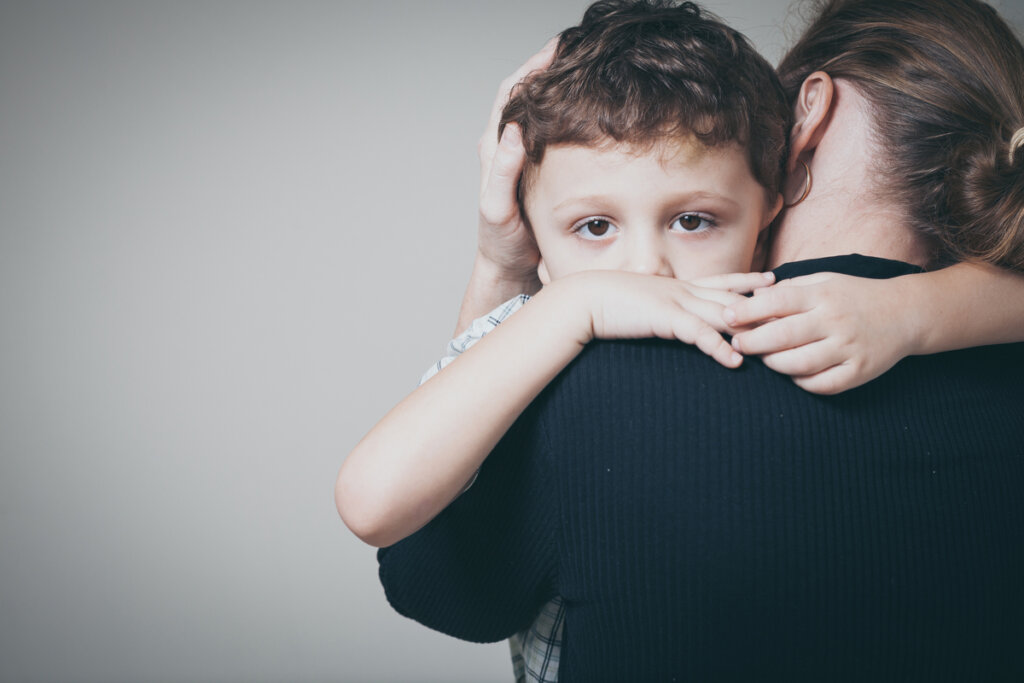Over-Adaptation in Children: Model Behavior That Hides Suffering

When you came into the world you were a blank sheet of paper. It was through your interactions with your environment, and especially with your primary caregivers, that you learned how to behave. In reality, the objective of socialization is to learn to live in society. Furthermore, to adapt to certain expectations in order to become a functional being. However, when this occurs to an excessive degree, over-adaptation occurs.
Children who suffer from over-adaptation don’t tend to recognize their problem until adulthood. They’re docile children, with good academic performances who don’t cause any problems for their parents or teachers. In fact, they present all the kinds of behaviors that are socially rewarded. However, this is at the cost of their own well-being.
Over-adaptation in children
Children who suffer from over-adaptation are, at first glance, model children and students. They’re infants who always do what’s expected of them. For example, they don’t annoy others, don’t interrupt, and they’re obedient and responsible. However, these characteristics, which are perceived as so positive by adults, should actually be seen as a red flag. Because childhood is, by its very nature, noisy and disruptive at times.
In their process of growth and the construction of their identity, children need space and freedom to be themselves. If they renounce their authenticity to conform to the expectations of others, they’re limiting themselves. This has significant psychological and emotional repercussions for them.

Main signs and symptoms
As we mentioned earlier, over-adaptation usually goes unnoticed. Here, we list the main characteristics of the disorder. Therefore, you can identify if your children comply with any of them:
- They’re good children, excessively correct, polite, and respectful
- They’re passive and have a tendency toward isolation and solitary activities. Furthermore, they’re usually shy, quiet, and withdrawn.
- They demonstrate a high intellectual level, a wide vocabulary, and a good academic performance. In their extracurricular activities, they show the same productivity and obedience.
- They tend to suppress their feelings and emotions so as not to upset or annoy their caregivers.
- They don’t oppose authority or rebel. On the contrary, they seek to be perfect children and are concerned about meeting what is required of them.
The consequences of over-adaptation in children
This pattern of over-adaptation tends to be maintained over time and generates important consequences. The following are the main and most relevant.
Difficulties in relating socially
These children have developed a great fear of rejection. Consequently, they may experience great difficulty in socializing. It’s common for them to fear exposing themselves. Therefore, they often choose to isolate themselves and avoid social interactions. In fact, they tend to be withdrawn and don’t take the initiative.
On the other hand, their need to constantly please others, not knowing how to say “no” or set limits takes its toll. This tends to become particularly apparent in adolescence and with their first romantic relationships.
Perfectionism and excessive stress
It’s common for these children to be extremely demanding with themselves. In fact, they seek perfection in everything they do to the point that this paralyzes them and generates high levels of stress. For example, a slightly lower grade, criticism, or a scolding from their parents or teachers can affect them deeply.
Passivity and dependence
When a child hasn’t been allowed to develop their personality adequately, they’ll have become accustomed to acting according to the expectations and demands of others. This implies that when they have to make decisions or take charge of themselves, they don’t know how to do it. For this reason, it’s common for them to become dependent.
Psychosomatic illnesses
These repressed emotions and impulses end up manifesting themselves through the body. That’s because they can’t be channeled in the usual way. Therefore, these children tend to suffer from headaches with no apparent cause, or gastrointestinal or dermatological problems.
Causes of over-adaptation in children
Generally, this tendency is the result of the child’s fear of losing the love of their parents. Naturally, children are totally dependent on adults. For this reason, angering or annoying them can really feel like a risk to their own survival.
Over-adaptation usually occurs when parents believe that their child must fulfill their aspirations and desires. However, what they should be understanding is that they, as parents, should be assuming the responsibility of promoting their development.
Due to their demanding family dynamics or because of the burdens that have been placed on them, these children have to behave as adults before their time. In fact, they’ve not been allowed to be children, or to choose and express their own opinions freely. As a matter of fact, they’ve had to over-adapt as a defense mechanism in order to function.

What can be done about it?
If a child exhibits over-adaptation behavior, any intervention will be directed primarily at their parents. In fact, they must modify their parenting style and allow and encourage the development of their child’s personality and identity. However, it’s common that this pattern isn’t detected until adulthood. If you recognize yourself as a victim of over-adaptation, you must start to allow yourself, from now on, your authenticity.
You’ll need to unlearn what you’ve learned and begin to get to know yourself. You must identify your own desires, the boundaries you want to set, and the emotions you need to express. Finally, you must uncover your identity that continues to be hidden.
Starting to live on your own terms will be difficult but also liberating. Don’t hesitate to seek professional help in order to carry out this transformation. Finally, you’ll be able to free yourself from all those burdens and allow yourself to be who you really are.
All cited sources were thoroughly reviewed by our team to ensure their quality, reliability, currency, and validity. The bibliography of this article was considered reliable and of academic or scientific accuracy.
- Hidalgo, M. C. (2006). Sobreadaptacion y enfermedad psicosomática (Bachelor’s thesis, Universidad del Azuay).
- Segoviano, M. (2000). El trastorno vincular sobreadaptativo. Psicoanalisis de las configuraciones vinculares: revista de la Asociación Argentina de Psicología y Psicoterapia de Grupo, 157-178.
- Quezada Quezada, J. D. (2005). Influencia del vínculo madre-hijo en los pacientes psicosomáticos sobreadaptados (Bachelor’s thesis, Universidad del Azuay).
This text is provided for informational purposes only and does not replace consultation with a professional. If in doubt, consult your specialist.








